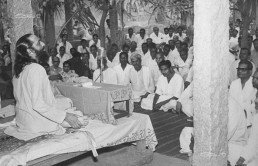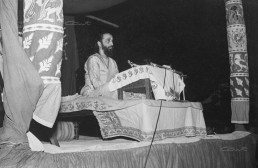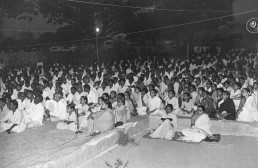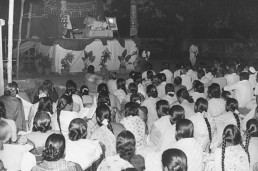
Jnana Yajna 70

Year & Dates:
May 17, 1960 to June 07, 1960

Yajna Topic:
Mundakopanishad

Place:
Hyderabad, India.
The word “Mundaka” brings up the picture of a young disciple with a shaven head sitting in an ashram at the revered Feet of his Guru. However, the Mundakopanishad which belongs to Atharva Veda is not only for the spiritual initiates and renunciates. The Upanishad’s 64 verses hold the great wisdom that will “shave away” the spiritual ignorance and reveal the Highest Knowledge to all sincere seekers. Taught by Sage Angiraa to the prosperous and dharmic householder, Shaunaka, this enlightening upanishad which opens extolling the Guru Parampara, was the topic chosen for Pujya Gurudev’s 70th Jnana Yajna at Hyderabad.
The Andhra Yuvathi Mandali Hall was blessed to be the yajnashala for the third time. While there was the inclination to construct a pandal on open grounds to accommodate the ever-increasing crowds, the organizing committee decided on the Hall to avoid interruptions by rain.So, on the evening of June 17, 1960, the pious refrain of the Maha Mantra welcomed all into the Andhra Yuvati Mandali Hall.
Systematic and Sublime
When Pujya Gurudev arrived at the entrance to the yajnashala at exactly 6:30 pm, Sri P. V. G. Raju, then Minister for Health, Andhra Pradesh, who inaugurated that yajna was waiting respectfully. Sri Daulat Rai, the president of Chinmaya Mission Hyderabad, promptly hoisted the Om flag, and the 70th Jnana Yajna’s inaugural ceremony began with the Chinmaya touch of punctuality that His yajnas stood for.
In His inaugural address, Sri. Raju sketched the struggle of a war-weary, progressive world and the questions that plagued it: “ ls there a positive way of arriving at the truth? Can we get light and guidance to lead us towards the goal of life? I believe that it is through the systematic revival of our ancient spiritual knowledge that we can move forward.”
A champion of spiritual revival, logical and scientific, Pujya Gurudev began the yajna devoting two days to the purpose, scope, and fundamentals of Upanishads. The admiring audience of Hyderabad grew in number each day and, as predicted, the hall was inadequate; the sea of seekers spilled over the galleries, the two wings of the hall, and the verandas. After a week, Pujya Gurudev directed that the evening discourses would move outside the hall. Mesmerized by His commanding voice and masterly exposition, even the breeze moved soft and cool, providing the keen seekers the perfect ambience to listen and meditate on that Brahma Vidya.
Pujya Gurudev ‘s morning classes on the most sublime second chapter of the Gita at the Liberty Gardens was in the idyllic setting under the fully-ripe mango trees. Occasional showers shifted the study indoors to the nearby Balaji Bhavan hall and Pujya Gurudev enthralled a bigger crowd on the glory of a Sthitaprajna at the main Mandali Hall. On May 29th, a Laksharchana of Vishnu Sahasranama transported all to a realm of rapturous devotion. The yatra to Yadagiri Gutta, to the ancient temple dedicated to Sri Lakshmi Narasimha Swami, was a journey to cherish for the 350 devotees.
When Pujya Gurudev concluded Mundakopanishad on June 8th and sanctified the audience with the Ganga waters, the thousands who gathered had an unforgettable glimpse at the Highest Knowledge that could remove the knots of ignorance and bestow lasting liberation.
Photo Gallery
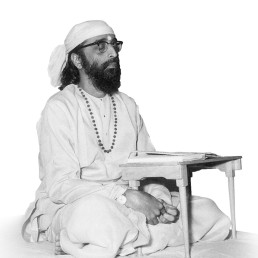
“Think,” Says Pujya Gurudev
The two birds, the real I and the false-I, live in one and the same tree, the body. The ego, in its delusions, goes on peaking at the hanging fruits and comes to suffer joy or sorrow, satisfaction or dis-satisfaction, according to the taste of the fruits packed. Some are ripe, some are unripe; the ripe ones are sweet, the unripe ones are sour. But, the other bird who all alone remains in undisturbed tranquility merely goes on witnessing the joys and sorrows of the bird busy with the fruits!
Here, the fruits are the Karmic fruits-the reactions of one’s own past actions. The past Karmas act on us only when we identify ourselves with our matter-envelopments, and, through them, with the world outside. An outer circumstance or an inner mental attitude cannot in itself give us either joy or sorrow, unless we get deludedly attached to it. The witnessing bird, though it lives in the same tree, comes to suffer neither the sourness nor the sweetness, because it has no desire to taste the hanging fruits, nor does it entertain any hopes to gain happiness from those fruits. It only goes on witnessing.
To remain as a pure witness rooted in our own Real Nature, as the All-perfect All-Blissful Pure Consciousness, is to transcend all pains, limitations and sufferings.
From Mundakopanishad Yajna Prasad
This is the Undying Truth!
The luminous essence of Consciousness pervades all, transcending forms and limitations. It remains unborn and undying, witnessing the activities of the body and mind. This ultimate Reality, beyond creation and destruction, is the source from which the world emerges.
